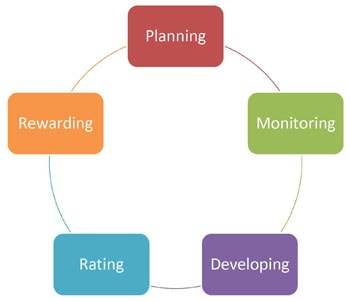As an independent agency working with corporate clients on performance management and improvement programmes, our focus is on the practical everyday issues around planning events. Occasionally it is beneficial to take a wider view and look at reward and recognition from a different perspective. We must not lose sight of the basic principles behind our work.
The U.S. Office of Personnel Management (OPM) serves as the chief human resources agency and personnel policy manager for the U.S. Federal Government. OPM’s divisions, offices, and their employees implement the programmes and deliver the services that enable the agency to meet its strategic goals. OPM works in several broad categories to lead and serve the Federal Government in enterprise human resource management by delivering policies and services to achieve a trusted effective civilian workforce.
Performance management approach
This is a section of the OPM web site that describes the agency’s approach to performance management. We are reproducing it here as an example of how a large public sector organisation defines this important leadership role:
Overview
Performance management involves much more than just assigning ratings. It is a continuous cycle that involves:
- Planning work in advance so that expectations and goals can be set;
- Monitoring progress and performance continually;
- Developing the employee’s ability to perform through training and work assignments;
- Rating periodically to summarize performance and,
- Rewarding good performance.

Planning
“Planning” means setting performance expectations and goals for groups and individuals to channel their efforts toward achieving organizational objectives. It also includes the measures that will be used to determine whether expectations and goals are being met. Involving employees in the planning process helps them understand the goals of the organization, what needs to be done, why it needs to be done, and how well it should be done.
Monitoring
“Monitoring” means consistently measuring performance and providing ongoing feedback to employees and work groups on their progress toward reaching their goals. Ongoing monitoring provides the opportunity to check how employees are doing and to identify and resolve any problems early.
Developing
“Developing” means increasing the capacity to perform through training, giving assignments that introduce new skills or higher level of responsibility, improving work processes, or other methods. Development efforts can encourage and strengthen good performance and help employees keep up with changes in the workplace.
Rating
“Rating” means evaluating employee or group performance against the elements and standards in an employee’s performance plan, summarizing that performance, and assigning a rating of record.
Rewarding
“Rewarding” means providing incentives to and recognition of employees, individually and as members of groups, for their performance and acknowledging their contributions to the organisation’s mission. There are many ways to acknowledge good performance, from a sincere “Thank You!” for a specific job well done to granting the highest level, agency-specific donors and establishing formal cash incentive and recognition award programs.
Working together
So, this is a great reminder for all of us involved in performance management and improvement activities that each element of the cycle is equally important. They are planning, monitoring, developing, rating and rewarding. Our contribution to our clients’ success is concentrated not only on recognition and reward for outstanding performance but also on the vital communication between the client company and its “audience” of all its stakeholders.
Gaining support and endorsement of the company’s goals and its business development strategy requires inclusive leadership and dialogue. We are experts in planning and managing a range of corporate communications events, including conferences, hospitality events and incentive travel programmes. They are important aspects of the overall performance management cycle.
Recent Posts
Archives
- July 2024
- May 2024
- January 2024
- December 2023
- September 2023
- April 2023
- January 2023
- November 2022
- September 2022
- August 2022
- June 2022
- April 2022
- January 2022
- September 2021
- August 2021
- June 2021
- May 2021
- February 2021
- January 2021
- December 2020
- November 2020
- October 2020
- September 2020
- August 2020
- July 2020
- June 2020
- May 2020
- November 2019
- October 2019
- September 2019
- August 2019
- July 2019
- June 2019
- May 2019
- April 2019
- March 2019
- February 2019
- January 2019
- December 2018
- November 2018
- October 2018
- September 2018
- August 2018
- July 2018
- June 2018
- May 2018
- April 2018
- March 2018
- December 2017
- October 2017
- September 2017
- July 2017
- February 2017
- November 2016
- March 2016
